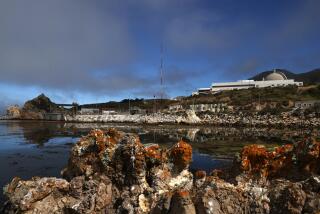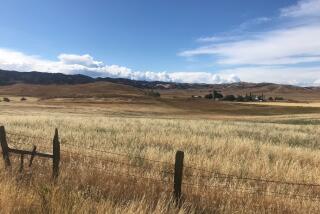Energy Dept. Finds No Reason to Reject Nuclear Waste Site
- Share via
After years of scrutiny and numerous studies, scientists have uncovered no environmental factors that would rule out Nevada’s Yucca Mountain as the future home of America’s first nuclear waste repository, according to a Department of Energy report released Friday.
In a mammoth, 1,400-page report, officials acknowledged that there is “a substantial amount of uncertainty associated with estimates of long-term repository performance.”
The document added that scientists used conservative estimates to gauge the long-range environmental impacts of the proposed waste site, which would house 77,000 tons of nuclear waste, much of which has been stored at sites across the U.S. since the dawn of the atomic age.
The mountain site, 100 miles northwest of Las Vegas, is intended to store the waste for as long as 100,000 years.
“In all our studies, we found nothing to disqualify this site,” Yucca Mountain Project spokesman Allen Benson said of the two-volume draft environmental impact statement. “We’re confident we’ve covered all our bases. But we’re waiting for public comment to help us see if we’ve missed anything.”
That public comment came swiftly Friday as project critics lambasted the report, saying it ignored key issues such as the waste dump’s location in an earthquake-prone area and offered scant details on how the government would move the waste across the country.
“At worst, this draft is misleading. At best, it is incomplete,” Sen. Harry Reid (D-Nev.) said in a statement Friday. “I am shocked that there is no discussion of the impact of transporting high-level nuclear waste through communities across the nation.”
Added Laura Chapin, a spokesman for Rep. Shelley Berkley (D-Nev.): “It’s one thing to have Yucca Mountain as a site, but we’re talking 100,000 cross-country trips to get this garbage to the mountain. We’re talking about a lot of highways and backyards here, folks. And Americans deserve to know more about what the government is up to.”
Critics said the government is afraid that releasing specifics on the proposed routes would incite protests from those who live along the way.
Under the government’s plan, the nuclear waste would be transported by truck and train from 77 nuclear reactors and military sites nationwide. The proposed routes would take the waste past 51 million people in 43 states, including California.
Benson said critics who claim that the report ignores proposed routes should read it again. “We’re quite confident we’ve addressed the transportation issue,” he said. “The draft report identifies potential routes that could be used to move this waste.
“We can’t choose a specific route now because in a best-case scenario we’re not going to begin shipping the waste for a number of years.”
He said the report also addresses the impact of earthquakes on the Yucca Mountain site. “One of the things it notes is that while Nevada may be a seismically active area, the immediate vicinity around Yucca Mountain is relatively quiet. Still, we’re designing a facility to withstand a magnitude 6.5 quake.”
The government will conduct 16 public hearings during a six-month comment period before releasing a final report. If the project is approved by Congress, officials will begin burying the nuclear waste in the isolated mountain by 2010.
More to Read
Sign up for Essential California
The most important California stories and recommendations in your inbox every morning.
You may occasionally receive promotional content from the Los Angeles Times.










